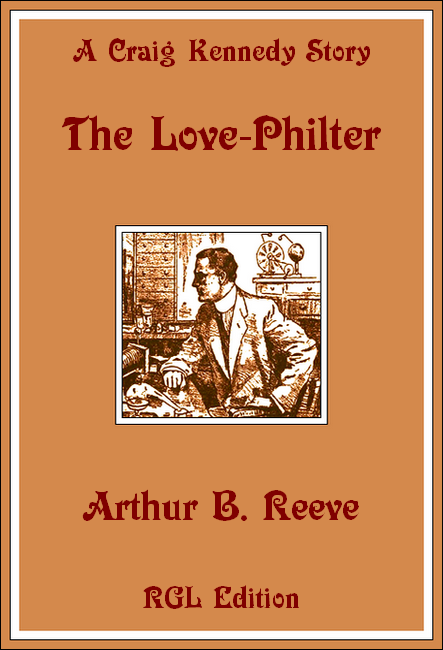
RGL e-Book Cover©
Roy Glashan's Library
Non sibi sed omnibus
Go to Home Page
This work is out of copyright in countries with a copyright
period of 70 years or less, after the year of the author's death.
If it is under copyright in your country of residence,
do not download or redistribute this file.
Original content added by RGL (e.g., introductions, notes,
RGL covers) is proprietary and protected by copyright.

RGL e-Book Cover©

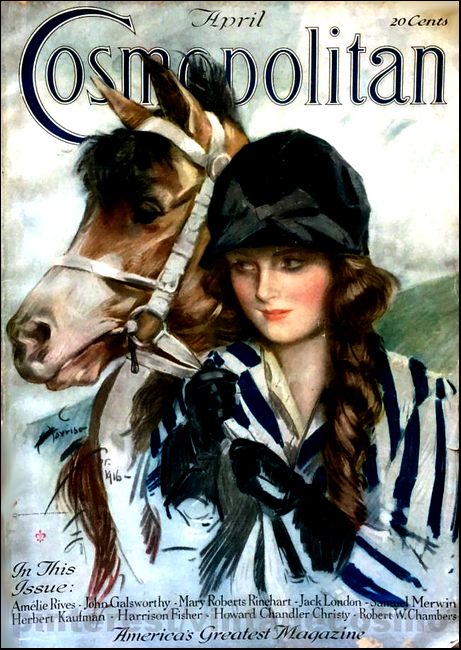
Cosmopolitan, April 1917, with "The Love Philter"
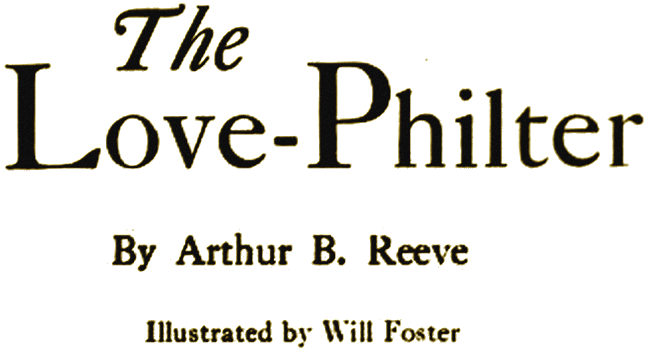
Craig Kennedy and his friend Jameson are making a little tour of the Caribbean. Lovely Trinidad, with its fine capital, Port of Spain, attracts them. Craig has come for much-needed rest and recreation, but he has brought along some of the invaluable material that never fails him in his struggles with the mysteries of crime. And, as luck will have it, Port of Spain is all ready with a case that is quite beyond the skill and science of the local authorities.
"IT'S most fortunate you are here, sir. The town is wildly excited, naturally. A beautiful woman—dead in a hotel. No clue whether it is suicide or murder. That's the situation. But I am confident, sir, that you can help us, if you will."
Our ship had scarcely dropped anchor off Port of Spain when we were boarded by the usual miscellaneous folk who seem to emerge from the very waters in every tropical harbor. Among them was a very heated little man in a white-linen jacket, bustling about and making inquiries.
To my surprise, it was Kennedy he sought. A moment only was necessary for Watts to introduce himself as the head of the police of the colony of Trinidad.
"We heard by wireless that you were on the ship, and I thought it might interest you," he explained. "The woman's name, at least the name by which she was known here, was Señora Lucia del Rey—an Argentinian and a widow."
As Watts spoke, I could not help noticing that a man had just come over the side of the ship and had greeted a woman whom we had met on the voyage, Ruth Brereton, the heiress of several millions which her father, Campbell Cooper, had made in the leather industry in New England.
"You see," raced on Watts, "there were a number of tourists at the King George—not a party exactly, but several who had happened to meet here, waiting for the next steamer. Well, day before yesterday they decided to make a visit to the famous asphalt lake at La Brea, and hired a launch so that they would be more comfortable."
Kennedy was interested immediately.
"It happened," he queried, "during the trip or——"
"No; after," supplied Watts. "They returned last night. It was at the hotel. Señora del Rey had gone to her room to dress. About an hour later, there was a scream from a lady, a Madame Martinez, who had the next suite. Attendants of the hotel rushed to the room. There the señora was—on the floor—in a convulsion. She never came out of it."
"No one had been with her at the time?"
"No; not even her maid. She had hired a native woman named Zelda as maid, but Zelda had not expected her back until the next day and was not there."
Just then, the couple I had been watching caught sight of Watts and moved over eagerly toward us.
"Let me introduce you to Mrs. Brereton," began the man, speaking to Watts, then turning to us. "Professor Kennedy? Mrs. Brereton has just told me she met you on the voyage."
"I'm so interested," chirped Mrs. Brereton, "I've never seen a real mystery before. Lambert has just told me."
"Indeed it is strange," monopolized Brereton, to the evident nervousness of Watts. "Why, my dear, I was invited on that trip in the launch. Wonderful sight—that lake! Only the trip took longer than they thought. I was afraid your boat might come in yesterday, so I returned alone by steamer, and train in the morning. The rest got back to the city last night—in fact, had hardly been back an hour when we heard Madame Martinez scream. It was all so sudden—even Doctor Gray couldn't do anything."
"Who were in the party?" asked Kennedy briskly,
"Why. let me see." Brereton took upon himself to answer, as though to impress Mrs. Brereton with his importance: "there was Señora del Rey, of course, and Professor Perry, a naturalist who had just returned from a six months' trip up the Orinoco. Then there was Madame Martinez, a Venezuelan, I think, and Monsieur Condé, a native of Martinique, a dealer in logwood and vegetable dyes. I think that was all besides myself."
Mrs. Brereton seemed keenly interested.
"Isn't it exciting?" she murmured. "Just think of it—a real murder mystery! Oh, I should so like to be a man and be able to help you!"
"Perhaps you can," muttered Watts dryly.
"Oh, do you really think so?"
"Well, you know, you American women have a reputation for cleverness," parried Watts, with, I thought, thinly-veiled sarcasm, as he edged us over toward the ship's side.
It was of no use. In the general mix-up, we found ourselves going ashore in the same small boat as the Breretons.
THE transfer gave me an opportunity to take a good look at the
island of a thousand hills before us. In a wide, open area
between the hills lay the city of Port of Spain.
Watts managed, however, to get us placed so that he could talk to us alone.
"We've considered about every possibility," he whispered aside, at intervals. "There is this Professor Ferry—he has been away from civilization for a long time. I don't know whether he was more friendly with the del Rey woman or with Madame Martinez, but I guess he was glad of the society of any woman after his trip. And Condé—he was one of the syndicate who made an unfortunate venture trying to corner the logwood of the West Indies. It lost a good deal of money, I fancy. However, I don't think that worried him. He was here seeking some other chance to make a fortune. He is one of those ardent Frenchmen. Well, for that matter, all the men were quite smitten with the señora—but—" Watts hesitated and paused.
"You must have some other suspicions," suggested Craig keenly.
The police officer lowered his voice even further.
"Suspicions—yes; facts—no."
"What do you mean?" pursued Kennedy.
"Well," he answered slowly, "there's an East Indian clerk at the hotel—Kali Dingh. You know, I suppose that, pretty nearly a third of our population is East Indian. Why, we thought he acted a bit strangely the night we found the señora—a bit officious, you know, more interested than a mere clerk ought to be." Watts paused again, as though not quite satisfied with his own reasons, then added hastily: "You know the French rule: Seek the woman. Well, it's slightly modified in this case. It seems that this Kali has been living with Zelda, the maid. We're watching both of them closely."
"But what motive could he have had?" I asked. Watts leaned over closer.
"Kali was infatuated with the señora," he whispered.
"An East Indian—in love with her?" I ventured incredulously.
"Kali Dingh was ambitious, something much above the coolies," defended Watts. "He considered himself far above them. Besides, he has made money here. You never can tell. Some of these people may be on the road to wealth and you'd not know it. At any rate, he knew he was as good as anybody. You shall see."
ASHORE, instead of going with the Breretons, who overwhelmed
us with their invitations to accompany them to the King George
immediately. Watts succeeded in having us driven to Government
House.
"The Red House," as they called Government House, was a truly amazing seat of officialdom, and the Savannah, a beautiful park, through which we passed, was unrivaled. The sights, however, we felt must be reserved, for, at present, Watts seemed bent only on acquainting us with the matter in hand, and we found that we were hourly expected at the headquarters.
"This is Doctor Gray, of whom you have heard," began Watts as we entered, introducing us to a middle-aged physician. "He was summoned almost immediately after Señora del Rey was discovered. Perhaps he can enlighten you more than I can on the purely medical side, though I have heard him express no theory."
"Theory?" shrugged the doctor, shaking hands. "I have no theory. If I had merely seen her, I should probably have said that it was a case of poisoning by strychnine."
"But wouldn't she have tasted it in anything that contained it?" asked Watts quickly.
"The bitterness of strychnine," measured the doctor, "does not affect the taste of some people, I have found. That is well authenticated in many cases. Besides, it could be masked by something else. When I saw her, she had the same tetanic convulsions that we associate with strychnine poisoning. I noticed that her senses were abnormally acute—once, the slamming of a door brought on a convulsion. Of course, it was pretty late when I was called in. Those were the indications, and I had to act quickly. I would not have thought it strange that I failed, but here's the strangest thing to me: When I made the tests of the contents of the stomach, there was no strychnine."
Evidently, Doctor Gray was quite as much at sea as Watts. Ordinarily, neither of them would have been willing to admit that an American detective could be of any assistance. But, in the face of the mystery and the veritable furor of popular excitement, they had felt forced to do something.
"I hardly think I can do anything until I have seen the body and looked over the rooms," remarked Kennedy finally, desperately seeking to cut the red tape of official procedure.
"Quite so, quite so," agreed Watts. "We have no time to waste."
HE and Doctor Gray drove us now to the King George. We were
approaching the hotel, perhaps a square or two off, when,
suddenly, a woman darted out from some shrubbery.
"Zelda!" exclaimed Watts, as he caught sight of the wildly-excited face of the woman. She was not unattractive to look at, physically well shaped, with regular features, black hair, and, aside from her dark skin, not unlike a European. Just now, in her excitement, it was evident that the fires of her feelings burned fiercely.
"You—are watching—my man—I know it!" she panted breathlessly. "I tell you—watch that other woman—and her friends!" She grew incoherent in her excitement, though it was plain that it was Madame Martinez whom she meant. Kennedy leaned over and caught the wrist she had extended toward us.
"What do you mean?" he demanded bluntly.
"That professor—and that other man!" she blurted out. "Watch them—there is a quarrel!"
With a wild effort, she tore herself loose and was gone as quickly as she had come. Kennedy glanced at Watts.
"Let her go," he decided. "Either she is concealing something or her knowledge is a slim suspicion. Perhaps it was to throw us off the right track. At any rate, you may depend that, if there is anything in it, we haven't seen the last of her."
We drove on slowly, and as we pulled up at the King George, we could see several groups of people on the porch.
"There's Perry now," pointed out Watts, "over there, talking with Madame Martinez."
A moment later, Watts approached them, introducing us. I must admit that, even at a glance, one could see that Madame Martinez was a remarkable woman, at once beautiful and baffling.
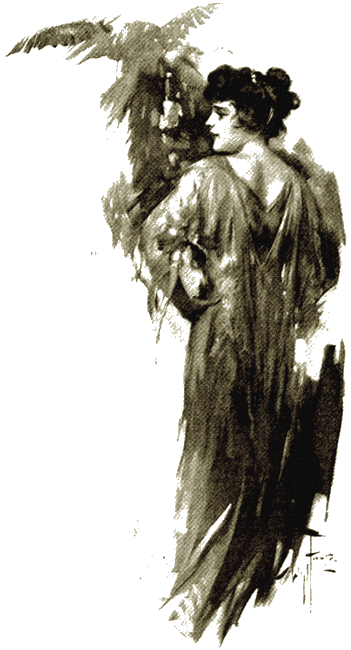
Madame Martinez was a remarkable woman, at once beautiful and baffling.
Perry was of a peculiar type. He was not precisely a student. There seemed to be in him a spirit of adventure, a sort of Wanderlust, I could well believe, as I heard afterward, that his connection with the American college was peculiar. The institution had been glad enough to father his expedition in name, in view of the fact that some one else had financed it. Yet one could not help but be impressed by the man. Even his speech had a dash and energy which sounded strangely in the general languor of the tropics.
We had scarcely time for the interchange of a few commonplace remarks when I saw the Breretons approaching. As they did so, I observed that each woman gave the other a quick, instinctive look of appraisal. Though they had already met, one could see that the two women did not mix. Ruth Brereton was of an entirely different type. Did she intuitively suspect the other woman of something?
Nor did it seem that either Madame Martinez or Perry were very eager to meet us. In fact, as soon as she politely could after an interchange of inconsequential inquiries on the subject uppermost in everybody's mind, Madame Martinez excused herself.
"It is dreadful!" she shuddered. "I have had them give me another suite in another part of the house. I am not settled yet; but I shall rejoin you as soon as I see what they are doing with my things."
Perry leveled a quick, nervous glance at Brereton but Said nothing. I turned in the direction in which they were looking, and, as I did so, Watts whispered to Kennedy: "Condé."
He was a tall, spare man with a dark, pointed mustache and a carefully-groomed dab of black whisker on his lower lip—a distinguished-looking fellow, but, somehow, not one to inspire much confidence. He passed within twenty feet of us, leaving the hotel, and I could not help feeling that it was more than a fancy that I observed an air almost of hostility between Perry and Condé. The look that Perry gave to Brereton was clearly an appeal.
"Really, Professor Kennedy," remarked Mrs. Brereton, who had been watching us, "I am almost tempted to take up Mr. Watts' suggestion and try to become an amateur detective. We've just been talking to Monsieur Condé. Mr. Brereton tells me that there was some gossip about him and Señora del Rey. It's quite exciting—all these stories. I mean to find out about them—what they are, and who started them. And, if I do, I'll let you know."
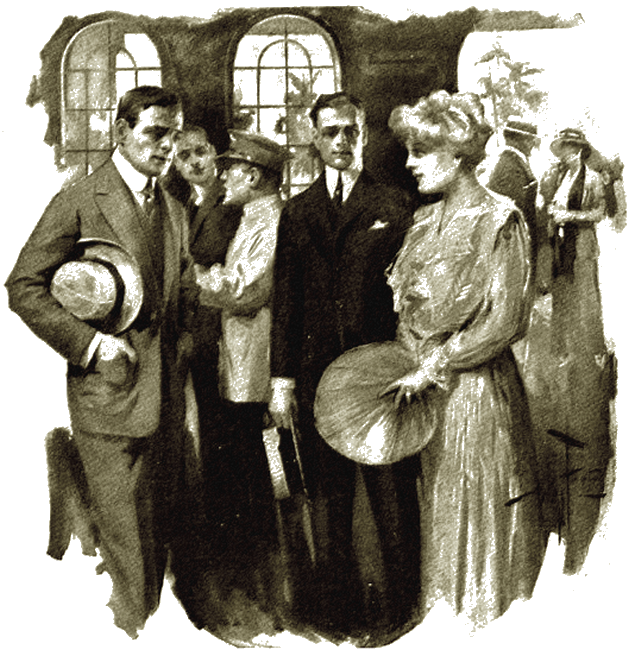
"Really, Professor Kennedy," remarked Mrs. Brereton, who
had been watching us, "I am almost tempted to take up Mr.
Watts' suggestion and try to become an amateur detective.
"Yes, by all means do," encouraged Kennedy, as Watts took him by the arm, anxious to carry out the purpose of our visit to the hotel.
"Humph!" commented Watts. "Gossip about Condé—why, they were all friendly with her—-Brereton, too! She may find out more than she bargained for."
"It can't do any harm," returned Kennedy. "The more we can get people to talk, the more we may learn from them."
I thought immediately of what Zelda had said about "that professor and that other man." Even if it were only pure gossip, it might have a bearing on the case.
WATTS and Doctor Gray led the way across the veranda through
the hotel, then across a court, or patio, in the center of the
oblong building, and up a flight of stairs to the second floor.
In a corner was the suite occupied by Señora del Rey, a
beautifully situated suite with a balcony overlooking the wide
public square.
There was a hush as Watts drew aside a curtain. There she lay, not, of course, as she had been found, for the body had had to be prepared for burial, which was to take place after Kennedy had seen it.
The señora had indeed been a beautiful woman—one who might very easily have stirred all the forbidden passions. I could readily imagine her in life—lithe, graceful, verging on the voluptuous, always gowned in the latest Paris modes, as South American ladies of wealth are.
"We knew you were coming," explained Watts, "and have tried to leave everything as nearly as it was."
A thorough search of the rooms, particularly the wide sitting-room, followed. In a corner stood a wicker writing-table.
Kennedy came to it finally, opened a drawer, and a portfolio was disclosed. The letters and papers inside were in great disorder. Kennedy turned them over.
"Here's something interesting—" he remarked, pausing, "a letter from Buenos Aires about her estate in the Gran Chaco. They must ship tan-wood. H'm—something must be missing here. Here are her bills—all receipted. I don't see any from the King George."
Hastily he scrawled a message on a piece of paper and handed it to Watts. "Send that to Buenos Aires immediately," he directed. "We may get some clue through her business connections."
Craig continued looking about. Among other things, he happened to open a little cabinet in the wall beside a dressing-table. In it was a bottle of Angostura bitters.
"'To stimulate an appetite and aid digestion," read Kennedy from the label. "Was it before dinner that this happened?"
"Yes," remarked Doctor Gray. "You know we are famous here for those bitters. We make them out of Angostura bark, the aromatic bark of the bitter Galipea cusporia, which we get from Venezuela. Yes; it's possible she may have taken some of that."
Kennedy considered a moment.
"Bring me a fresh bottle just like this from the café," he ordered, at length.
Meanwhile, he continued looking over the room, but found nothing that interested him so much as the portfolio and the bitters. A few moments later, there was a knock on the door, and I opened it, for I happened to be nearest. It was an attendant with the fresh bottle of bitters.
He must have thought that I was crazy, for at the moment he was about to hand me the bottle, I saw, or fancied I saw, some one down the corridor watching. I did not wait to take the bottle, but darted down. But, by the time I reached the turn, no one was to be seen.
"Kali Dingh. I'll wager," commented Watts, as I returned, baffled, and explained. "You may depend that he knows now that we ordered that bottle sent up-"
Kennedy said nothing, but, the moment the servant had withdrawn, drew from a small traveling-case in his pocket a peculiar-shaped little syringe, with a rubber bulb and, it seemed, an outer glass tube, covering one inside, on which were the markings of a scale.
He dipped the nose of the syringe into the bottle which he had found, and sucked up a quantity of the bitters until he seemed to have enough. As he removed it, it seemed as if a small float inside came to rest. Carefully he studied the scale.
Next, he emptied the liquid into a basin, and again slipped the nose of the syringe into the fresh bottle of bitters, which I had opened. Again he read the scale.
"My hydrometer gives a greater specific gravity for her bitters than for this fresh bottle, according to the Beaumé scale," he remarked thoughtfully. "Of course, this doesn't prove anything, but I thought it would quickly tell whether there was any use going further. You may take charge of those two bottles, Walter. I shall have to study them more carefully later. So far, at least, there's nothing to indicate suicide."
"What motive could there have been, then?" I queried, taking the bottles. "Could it have been robbery?"
Watts shook his head emphatically.
"There is nothing gone—neither jewels nor money—so far as we can see," he answered, then lowered his voice with a glance at the door, as if afraid that there might be an ear to it. "No; I am sure that it is purely a crime of passion. Kali Dingh was hopelessly infatuated with her. That I am sure about, at least."
"But why should he kill her?" I questioned.
Watts shook his head. Evidently he had reached the end of his power of analysis, and only new facts could help him out.
A FEW moments later, we left the room and went downstairs.
Perry was gone, and Madame Martinez was still in her room, while
the Breretons were not about, either.
At the request of Kennedy, we stopped in the office so that we might have a chance to look at Kali Dingh. He was a rather good-looking fellow, with glossy dark hair and piercing black eyes. By his manner, back of the desk, one could readily see that he was proud of his position as contrasted with the more humble occupations of many of his countrymen. I was not so incredulous of his aspirations regarding the señora after seeing and talking with him.
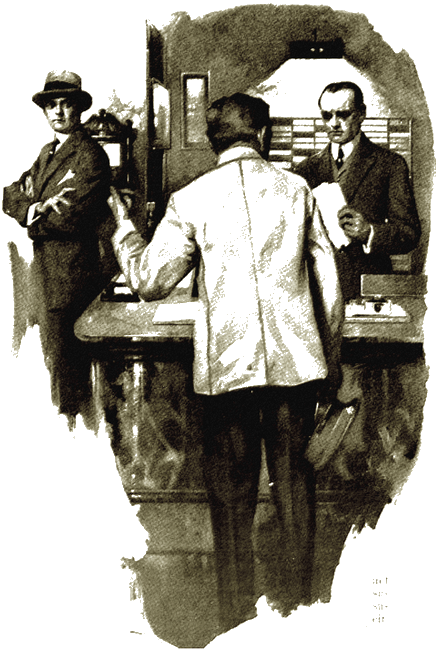
We stopped in the office so that we might have a chance to look at Kali Dingh.
Following a request from Kennedy, Watts sent him on an errand that took him out of the office. Dingh seemed to resent it, but evidently considered it bad policy to refuse.
The moment he was gone, Craig plunged into the hotel accounts, rapidly running over the bills of the various guests. From what I overheard, it was apparent that some one had been paying the señora bills and that the same was probably true of Madame Martinez. Every now and then, Craig and Watts would run across items that indicated payments by Perry, Brereton, or Condé. It seemed as though Dingh had been keeping a record, perhaps for his own information. Taken alone, it indicated little, but in connection with other things, it might mean much. It was the discovery of those other things that must engage our attention.
Craig and Watts had completed their cursory examination and making of notes of what they had found before Kali returned, and, as he did so, we could see that he was preoccupied. I thought perhaps it had to do with us, but it did not. A moment afterward, Condé entered the hotel. I could not help wondering whether he had been away all the time since we had seen him go out. At any rate, it seemed as if Kali were watching Condé, too. I asked myself why. Every action of Dingh showed that he knew he was under suspicion. Had Zelda and he agreed to try to cast suspicion on some one else? I felt sure that if either were in a position to tell us anything, we should not have been long in the dark.
SO much having been accomplished, Kennedy lost no time in
having his huge iron-bound case brought ashore from the ship and
establishing himself with his traveling laboratory temporarily in
an inner room of Watts' office at Government House rather than at
the hotel, where he felt that whatever he did might be the object
of scrutiny by too many interested eyes. These preparations
greatly impressed Watts, who, like myself, soon discovered that
when Craig had plunged into one of his scientific analyses, he
was of no assistance, but actually in the way.
"Meanwhile," remarked Watts finally. "I think I might as well be working on that quiet little theory of my own. I am going over to Coolietown, as we call that quarter where the East Indians live, and hunt up Zelda. Would you like to accompany me, Mr. Jameson?"
I was about to reply that I would be delighted, when Kennedy interrupted.
"I would much rather have you stay around the hotel," he ventured to me. "You're a pretty good mixer, Walter. While Watts is working that end, I think you can spend your time to advantage watching what is going on there."
Our program arranged, we left him deep again in his study of the bitters.
"A most extraordinary chap," commented Watts, as we passed out of the building.
It did not take me long to discover that I was a marked man in the little community. It seemed to have gone forth who I was and that I was associated with Kennedy. Those whom I wanted to see were not about, and others were too much in evidence. As I sauntered past the office, I caught sight of Mrs. Brereton industriously quizzing Kali, but her husband was not to be seen, or Perry and Condé, and Madame Martinez must have been satisfied with her new quarters, for she stuck closely to them.
Accordingly, I had nothing to report to Kennedy when he came in for a late luncheon, although he seemed much interested in the mere fact that they were all avoiding us. No word had come from Watts, either, but, from Craig's manner, I could see that he was making progress in his own investigations.
"Let me know, whatever happens," he directed, as he returned to Government House, leaving me at the hotel.
Brereton came in shortly afterward and seemed, I thought, preoccupied, for he scarcely ate any lunch, and directly afterward excused himself from Mrs. Brereton to look after transferring her luggage from the ship. I had hoped to get a chance to speak at least to them, but before I knew it, she, too, was gone.
It was shortly afterward that I saw Perry approaching the hotel from the direction of the shops in the town. As he entered, he looked about anxiously, seeking some one. I strode over toward him, and, as I did so, I noticed that he had a package in his hand which he was carrying very carefully.
"Have you seen Mr. Brereton?" he asked, apparently suppressing great agitation.
"Yes," I replied; "he just left, and I thought I overheard him say something to Mrs. Brereton about looking after her luggage."
Perry scowled, then suddenly turned on his heel and retraced his steps in the direction of the town. For a moment, I was tempted to trail him, but reconsidered. There was not a chance of his not discovering me, and such an action might do more harm than good at this juncture.
It was not five minutes later that I was glad of my decision, for I saw Condé, who must have been in his room all the time, leave rather hurriedly, accompanied by a man whom I had seen before and who had been associated with him in the logwood speculation. He also was carrying a small package.
The secrecy of their actions had, by this time, got on my nerves. I was burning to know what was underneath it all. Surely, if they were thus avoiding us, there must be some reason, and we might, with the aid of Watts, put some one to work whom they would not recognize or suspect. For all I knew, they might be disposing of some evidence in their mysterious packages. I could stand it no longer. I almost ran over to Government House to inform Kennedy before it was too late.
To my surprise, as I entered the inner office, I saw that Mrs. Brereton was already there, pouring into Kennedy's attentive ears some story. I paused at the door.
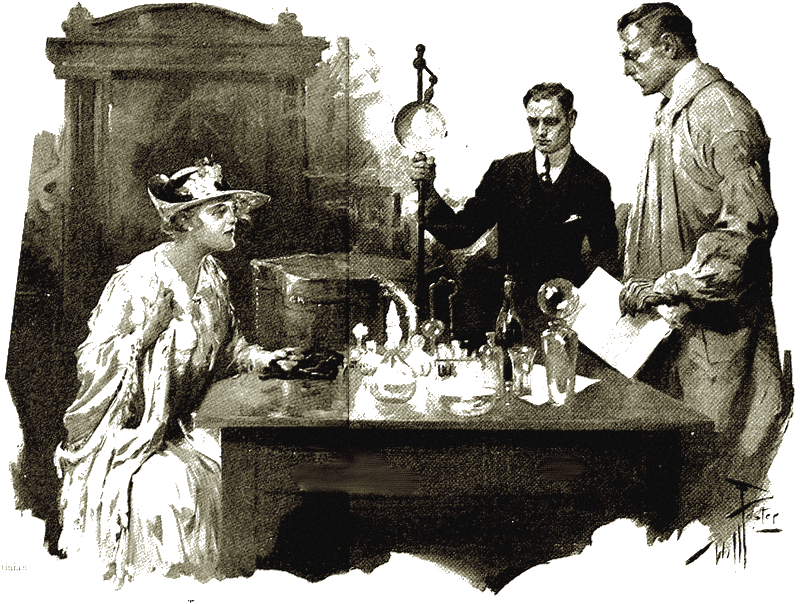
To my surprise, as I entered the inner office, I saw that Mrs.
Brereton
was already there, pouring into Kennedy's attentive ears some story.
"It is all right," reassured Kennedy, glancing from me to her. "Anything you may wish to say to me you can safely tell Mr. Jameson also. Mrs. Brereton has been playing detective, Walter," he added. "She, too, has been investigating in the office. I think Kali Dingh must have been more willing to talk to her than to us."
"You know," she explained to me, "I saw her, the señora, lying up in the room and—well, Madame Martinez, too. I don't like to be suspicious or to misjudge people, but—you will pardon me—I think she was somewhat of an adventuress." As she said it. I wondered whether there might be something of the puritanical about the remark, but she hastened to add, "I don't mean that I thought I might find something that would excuse the murder—but perhaps explain it."
I noticed that Kennedy had a paper in his hand.
"There, for instance," she went on, indicating it, "is the copy of a bill for a rather gay dinner the other night. I understand they were all there—Señora del Rey, Madame Martinez, Professor Perry, Monsieur Condé, and Mr. Brereton."
It seemed as if the last name stuck in her throat. Evidently she did not relish the idea. I did not blame her, but there was nothing I could say. Defense of Brereton was impossible, criticism gratuitous. At least, all were involved, and I could imagine that Kali was taking a rather pleasant revenge for his rejected suit in airing even this basis for a scandal.
"They tell me that the men split the check—it was rather high, as you will see—and that everything was proper and all that. But then, of course, they would tell a wife that."
It easy to see that Ruth Brereton was properly jealous of her husband. Yet I could not see how the escapades of her husband, even if there had been any, helped us in clearing up the mystery.
"Then you think these rumors about Professor Perry and Monsieur Condé may have originated in the—er—excitement of the dinner?" asked Kennedy. "You remember you said you were going to find out about the gossip—who started it, and all that."
"Yes, I know," she answered slowly. "Well, I haven't found out—yet. Only, I can see that there is something wrong. I've asked my husband, but all I can get out of him is a hint that Monsieur Condé thinks Professor Perry has said something that reflects on him. Oh, I don't expect men to tell anything on each other. They may talk about the Freemasonry of women, but it's nothing to the way men hang together. Why, I wouldn't even expect to worm anything out of you, Professor Kennedy, on a subject like this."
Kennedy only smiled at this.
"I think Mrs. Brereton is right," I ventured. "There is something under the surface. That is why I left the hotel. Both Professor Perry and Monsieur Condé have been there since Mr. Brereton and she left. Both seemed anxious, though they did not see each other, and each was carrying a package—Perry to the hotel, and Condé away from it. I think they ought to be watched."
Kennedy pondered for a moment, then turned to the table he had drawn up next to his traveling laboratory, as though loath to cut short an investigation dear to his heart. He had been working fast, and his very manner told that he had found something which he would announce at the proper time.
"I think you are right, Walter," he agreed, at length. "However, just now I feel that I must complete my work here. I shan't be long. You don't bother me, either. Won't you talk with Mrs. Brereton a few moments?"
Mrs. Brereton and I moved over to the far corner of the room, by a window looking out on the park, and talked in low tones. Kennedy plunged back into his work.
I thought that Brereton had contrived to be a good deal away from her, even in the brief time since her arrival, but did not like to say anything about it. In fact, I hardly knew just what to talk about, for, except for this case, we had very little in common.
"So you never got at the source of the rumors," I managed to say finally.
"No," she replied quickly. "You have seen Monsieur Condé. If Professor Perry had said something, he is not the sort that would let it pass; and if he hadn't, I don't think Monsieur Condé would be easily satisfied with explanations. Then there's Madame Martinez. How do we know? It all may be an elaborate play that they are staging for some one's benefit. I do know this: they resent my intrusion." The door opened.
"Come, now—a little lively!" ordered a familiar voice. We turned. It was Watts.
To my utter surprise, beside him cowered the once dapper Kali Dingh, and behind, with a constable watchfully near, stood Zelda, sullen, defiant. She shot a quick look of venom at Mrs. Brereton, then changed it, evidently not seeing the woman she had expected.
"I think I've solved it!" cried Watts.
Kennedy laid down a test-tube containing something he had been studying.
"Yes?" he queried, with interest.
Watts turned and beckoned to Zelda to come forward. She did so reluctantly, half forced by the constable.
"She attacked me again while I was watching in Coolietown," he began, "and I was forced to arrest her. But I think I've made her tell the truth now." Dramatically, he placed a little bottle on the table. "It is a love-potion—a philter," he announced.
"A love-potion?" I exclaimed.
"Yes—you know, an expedient much practised in the East for inspiring or securing love. For the preparation of love-philters, certain animals and plants have always been supposed to be especially adapted. I don't know what is in the stuff. Perhaps," he added, with a glance at Kennedy's paraphernalia strewn over the table, "the professor can tell us. All I know is this—and it is enough: Kali Dingh hid it in your house, didn't he—swore you to secrecy?"
Zelda, her eyes fixed on Watts, nodded sullenly.
"I found it after I had made a systematic search," added Watts.
"It was all that other woman—my mistress!" burst forth Zelda furiously. "I told him she was Mr. Brereton's friend but——"
"What! My husband!" broke in Mrs. Brereton, as indignant now at the suggestion as she had been ready to hint at it herself ten minutes previously. "You do not know what you are talking about!" The two women faced each other. "I only know what I know," persisted Zelda.
"You will pardon me, Mrs. Brereton," interposed Watts. "I think I hinted to you strongly once that you might be easier in your mind if you would let the police alone in this. Please—just a moment! Zelda, Kali was infatuated with the señora, your mistress, wasn't he? You found him in her apartment while she was on the trip to the pitch lake, didn't you? You saw him do nothing—but after she died, he hid this bottle?"
There was something of the fury of the woman scorned in the manner in which Zelda made the admissions Watts extracted. As for Kali, he stood there, mute. I think it was that that exasperated Watts more than anything else.
For a moment, Kennedy looked perplexed. Then his face brightened. Quickly he poured some of the pure bitters into a jar and added an amount from the contents of the bottle which Watts had brought. A moment he studied the mixture and, alternately, a paper on which he had been making some notes of his work.
"Still not the same specific gravity as the bitters in the bottle found in her room," he remarked quietly.
Watts's face was a study. He had produced evidences of criminality—and Kennedy calmly brushed them aside with a simple little hydrometer.
Before anyone could say a word, Kali, still mute, stepped forward. With a subtle smile, he quickly poured the whole of the remainder of the contents of Watts' bottle into the tube with the bitters, then raised it to his lips—and drank.
For a moment we looked at each other tensely. Nothing happened.
"Absolutely harmless," commented Craig, keenly watching Kali, as if for symptoms. "The fact of the matter is," he went on. "I have actually found something in those bitters in her room that I couldn't account for. This explains it."
"Then you found something else you could explain?" Watts jumped at the conclusion. "Strychnine?"
Kennedy shook his head.
"My analysis both of the contents of the stomach which Doctor Gray very kindly sent me and of the liquid in the bottle shows no strychnine," he replied.
We all drew forward eagerly. What strange poison, then, might it be? Whence had it come?
A tap at the door was followed by the entrance of a messenger with a yellow envelope bearing the word. "Cablegram." Craig read it, folded it up, and went on:
"You are familiar, I suppose, with the Argentine quebracho bark—the tan-wood? White quebracho—the 'ax-breaker' it means—yields the powerful drug, quebrachamin. It has an effect like strychnine—yet the tests for it are different."
I thought involuntarily of Condé and his venture in dyewood.
There was the sound of hurried footsteps outside, and again the door flew open. It was Madame Martinez, in wild excitement.
"You—you must stop them—before it is too late! You must!" she cried vehemently. "Oh, Madre de Bios, they are fighting a duel! Hurry—you must hurry! He will be killed—killed!"
"A duel?" demanded Kennedy. "Who—where?"
"Professor Perry—Monsieur Condé—on the other side of the Savannah. Oh, don't stand here talking! Come—hurry!"
She needed to urge us no further. Kennedy had darted out of the door, waiting only for Madame Martinez to point the way. The constable forgot Zelda, but Watts, still unwilling to admit defeat, forced Kali along with him. I took Mrs. Brereton's arm to help her, although excitement almost made me forget that gallantry. Across the Savannah we ran—a strange party.
Sure enough, there on the other side, in a place that might have been the very outskirts of the jungle, so thickly was it screened off, we came upon a group even stranger than our own.
"Oh!" wailed Madame Martinez, "can't some one stop them? He must not die—he must not! I—I love him!"
At a carefully marked distance that might have been twenty paces stood Perry and Condé, apart, each in his shirt-sleeves and each with a revolver in his hand. At one side stood Brereton, holding up a white handkerchief, ready to drop it to the ground.
Perry's discomfiture was evident and frank as Madame Martinez ran to him. As for Condé, he seemed nonchalantly to be in his element, having just finished chatting with his friend of the logwood syndicate.
"Gentlemen—gentlemen," interrupted Kennedy, "just a moment!"
"You have not said anything about him and the señora—say it—you have not!" cried Madame Martinez.
For a moment, it seemed as if the sight of her had roused Condé even more, and I think he would have fired anyhow, if she had not herself been in the line of sight.
"Is this some of your work, too, Kali?" demanded Watts, roughly shoving the Indian forward.
"No—no!" he cringed back, catching sight of the cold steel, "On my honor—no—no!"
"It's true," shot out Kennedy, "the credulous Kali Dingh gave the señora the love-potion. That has complicated the case—that is all. But," he added slowly, as if to secure the greatest effect, "in the bottle of bitters I discovered in her room, some one else had already or perhaps later placed quebrachamin—the poison of the tan-bark. Perhaps the real murderer seized on that chance to throw suspicion on some one else. He has been doing so all along."
Everyone seemed to be talking at once as we crowded about Kennedy.
"Really, sir. I should be fighting you—not him." I heard a voice behind me say. "I think it was you who started the story—that you left us so that you could——"
I turned, but before I could see anyone, a scream interrupted me.
"It was not I you were in love with—it was my money!"
Ruth Brereton had picked up the cablegram which Kennedy had inadvertently dropped.
SAMPLES OF QUEBRACHO EXTRACT FURNISHED BRERETON PENDING PROPOSED TAN-WOOD CONTRACT.
Brereton had fallen, already rigid, with the same poison he
had given the señora in the dilemma of his infidelity.
Roy Glashan's Library
Non sibi sed omnibus
Go to Home Page
This work is out of copyright in countries with a copyright
period of 70 years or less, after the year of the author's death.
If it is under copyright in your country of residence,
do not download or redistribute this file.
Original content added by RGL (e.g., introductions, notes,
RGL covers) is proprietary and protected by copyright.